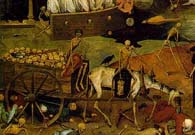This all began about a hundred years ago, at a small town in Louisiana. On the outskirts of town, there was a peculiar little park, right on the edge of the bayou, nestled between a cemetery on one side and a swamp on the other. The cemetery had been there even before there was a town -- some said it had always been a burial ground. |
Serious warning: Children or persons of a delicate constitution might find this story unsettling, and should probably just go "home." (No one will think any less highly of you, or call you a "fraidy cat.") |
Serious warning: Children or persons of a delicate constitution might find this story unsettling, and should probably just go "home." (No one will think any less highly of you, or call you a "fraidy cat.") |
The "official" ruling was that a freak storm had come up, and that people must have gotten disoriented and scrambled into the swamp. As time went by, nobody wanted to talk about it any more, and besides, all the people who were there that night have long since passed away. But the park is still there (close to the highway now), and they say that if you go there under the harvest moon, around midnight, and the wind is just right ... if you listen closely enough, you can hear four people screaming, and a tuba playing, "oom-pah-pah, oom-pah-pah, oom-pah-pah, oom-pah-pah..." |
Apparently, most of the townspeople ran all the way home, and locked themselves inside. The next morning, when the sheriff asked around, he found that seventeen people were missing, including the entire brass quartet. He organized a search party, and they dragged hooks through the swamp looking for bodies, but the only thing they found was ... a tuba. |
Amid the screams of the quartet and the deafening "oom-pah-pah, oom-pah-pah," the audience scattered toward the path ... but the lanterns didn't seem to lead the right direction. Some of the people ran straight into the swamp, and others into the cemetery -- some later said they had seen the cemetery "swaller folks up." |
At this point, the details get sketchy. Some said that the French horn player finally stopped playing, and tried to plug her ears, but her hand was stuck in the bell of her horn. Others said it looked like every time the trombone player pushed out his slide, his legs got shorter. Pretty much everyone agreed that one trumpet player's face slowly disappeared into his mouthpiece, while the other's fingers seemed to slip down into his trumpet valves. |
Nobody remembered when they first heard the tuba playing. Some later said they thought it had been playing the whole performance, but at first they thought it was just the wind. Pretty much everyone agreed that by the time the quartet played their final number -- I was told it was "The Belgian March," by Scotson Clark -- there was definitely a tuba playing, in three-quarter time! "Oom-pah-pah, oom-pah-pah," louder and louder... |
The next year, the party proceeded as usual, on a beautiful, clear night. As the brass quartet started to play, a breeze began to rustle through the trees. The wind blew stronger, and the members of the brass quartet were seen to glance at each other, looking a little worried. |
One year, the tuba player didn't come home after the party. Some of the audience remembered that he really hadn't played very well that night, and some even said they had heard the members of the quintet arguing after the performance. Everyone in town knew that the other four tended to talk about the tuba player behind his back, and complain about his incessant "oom-pah-pah, oom-pah-pah," tuba playing. Word quickly spread through town that the other four had murdered the tuba player, and tossed his body (and his tuba) into the swamp. The sheriff was notified, and eventually made his way to the park, but found nothing, and told the townspeople that even if he had found a body, he wasn't sure there was a law in that parish against killing a tuba player. So, that was pretty much the end of it. |
Anyway, the park's real "claim to fame" was that it was thought to be the lowest patch of ground in the entire parish. In fact, every autumn, during the harvest, on the night of a full moon, the townspeople would gather there for a big "Bottom o' the Parish" party. They would line the path into the park with kerosene lanterns (so no one would stumble into either the cemetery or the swamp), set up plank benches and tables, and have food, games, and entertainment. The highlight of the entertainment was always a performance by the local brass quintet. |
This all began about a hundred years ago, at a small town in Louisiana. On the outskirts of town, there was a peculiar little park, right on the edge of the bayou, nestled between a cemetery on one side and a swamp on the other. The cemetery had been there even before there was a town -- some said it had always been a burial ground. |



